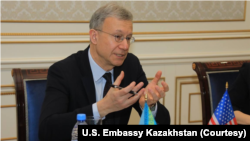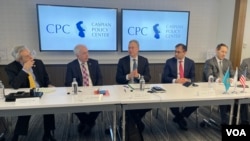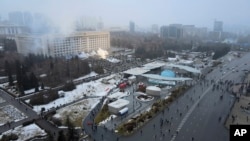U.S. strategic interests in Central Asia boil down to stability and sovereignty, according to Washington's top diplomat in Kazakhstan, an oil-rich republic sharing long borders with Russia and China.
With an eye on the ongoing Russian aggression against Ukraine, a fellow former Soviet republic, the countries in the region have adopted a hedging strategy, maintaining deep links to Moscow while also bolstering relations with the West.
U.S. Ambassador to Kazakhstan Daniel Rosenblum told the Caspian Policy Center gathering on Jan. 4, that the main goal of U.S. policy for Central Asia is to ensure that Kazakhstan, Kyrgyzstan, Tajikistan, Turkmenistan and Uzbekistan “stand on their own, be fully sovereign and independent countries that can make their own choices about who to associate with, who to trade with, who to have relations with — without undue external pressure.”
Rosenblum pointed to the so-called C5+1 group, including the United States and the five republics, underlining its “value in acting as a group, integrating with one another, cooperating — that makes each of them stronger individually.”
A second focus for Washington is border security and counterterrorism, a third is boosting trade and investment, and a fourth is promoting human rights and the rule of law, he said.
Economic and political aspects
Kazakhstan is America’s top business partner in Central Asia, with $3 billion in bilateral trade in 2022 and an estimated 15% increase last year, plus $5 billion direct investment in 2023.
Despite holding regular talks on human rights, Rosenblum said Washington and Astana “do not see eye-to-eye” on the lack of meaningful political competition and the continuous arrests of critical voices.
The New York-based Human Rights Watch sites enduring concerns.
"Two years after large-scale anti-government protests rocked Kazakhstan in January 2022, few officials have been held accountable for their part in [the] disproportionate use of force against protesters, arbitrary arrests and imprisonment, and torture and ill-treatment of detainees," HRW stated in its annual report issued this week.
“When I arrived in November 2022, there were seven names on the list [of political prisoners], which had been going down steadily. And now there are 23, which is not a good trend,” Rosenblum said.
Akbota Karibayeva, a Ph.D. candidate at the George Washington University, agreed with Rosenblum, stressing that President Kassym-Jomart Tokayev’s transformation package branded as the "New Kazakhstan" has not yet had major effects.
“In the 'New Kazakhstan,’ we continue to see a familiar cycle of detaining activists for expressing their opinions and repeatedly denying registration to opposition movements. The space for dissenting voices has barely expanded, if at all,” Karibayeva told VOA.
Asserting that Astana is complying with sanctions against Russia, Rosenblum pointed to the U.S., EU and U.K. comprised list of 45 categories of goods.
“Those 45, our experts say, are less than 2% of Kazakhstan's exports to Russia. Even if they weren't controlling it at all, it would not constitute more than 2%,” he said.
Rosenblum defended Kazakhstan, which has a 7,644-kilometer border with Russia.
“Since the sanctions were first imposed back in 2022, Kazakhstan's record, I’d argue, is a good one, both in terms of their ability to prevent sanctions evasion and also making sure that they're complying with all the sanctions when it comes to their domestic companies, relationships with Russian companies, Russian banks, and so on,” he said.
Kazakhstan last month removed the Taliban from its list of terrorist groups.
“They gave us advance notice that they were doing this, which is in the spirit of the partnership of no surprises,” Rosenblum said. “Kazakhstan has made clear that it will not recognize the Taliban government, and that remains its position until there's an international consensus and certain benchmarks are made. And this doesn't change that. They've also made clear that they prioritize developing some level of economic relations with Afghanistan, even with the Taliban regime in charge there.”
Kazakhstan vs. Uzbekistan
Before his current assignment, Rosenblum served as ambassador to Uzbekistan, whose leadership has also promised reforms.
“When I arrived in Tashkent [in 2019], it was already a couple of years into the reform process. … Things were slowing down,” he said.
In Rosenblum's view, Uzbekistan's initial steps toward change were dramatic, despite the backslidings many observe now, specifically the systemic challenges, testing President Shavkat Mirziyoyev’s commitment and his regime’s willingness to transition from an ingrained authoritarian government to a democratic one.
Kazakhstan, he said, has cycled through reform phases producing limited advances, "as opposed to what was really like a sea change, kind of a watershed in Uzbekistan, where suddenly the closed system was opened up.”
Since 2022, following the January civil unrest that left at least 227 dead, Kazakhstan changed its constitution, held presidential and parliamentary elections that Tokayev coined as “democratic” despite the lack of opposition. He has vowed to leave office in 2029, at the end of his seven-year presidential term.
Tokayev pledged to decentralize power and strengthen local governance, moves that Rosenblum said are still unfolding.
“The jury is still out. We have to give some time to see,” he said.
China, Russia, Iran
One issue Washington and Astana disagree on is China’s treatment of Uyghurs, atrocities that the U.S. considers a genocide and crimes against humanity. Yet Rosenblum sees some daylight there.
“There are some Uyghurs and ethnic Kazakhs who are able to cross the border. They don't necessarily receive refugee status, but they've essentially taken refuge in Kazakhstan, which has lived up to its international obligations of nonrefoulement,” he said, referring to the principle that asylum-seekers should not be returned to countries where they face serious threat to life or freedom.
“They do not send people back to China,” he said.
Kazakhstan’s trade with China recently surpassed $30 billion, which is 10 times more than its trade with the United States, which Rosenblum said he does not find surprising “since they are close neighbors.”
“Kazakhs are sort of bullish on economic relations with China. They are not as exposed or as vulnerable, arguably, as other Central Asian countries because they haven't taken on nearly as much Chinese debt,” he said.
Kazakhstan will continue to diversify its political and economic partnerships, Rosenblum predicted, despite China’s growing influence and the country’s continuing dependence on Russia for energy.
Russian nationalists’ frequent calls to annex Kazakhstan are viewed alarmingly in Astana, Rosenblum said, but he added, “I don't feel like there's a sense of any imminent danger or threat to the northern border of Kazakhstan.”
As part of the Moscow-led Eurasian Economic Union, Kazakhstan recently signed a free trade deal with Iran. Rosenblum said Astana consults with Washington on this issue as well.
“The Kazakh government by now has learned what’s sanctionable and what isn't,” he said.
Kazakhstan, a regional leader?
While Rosenblum praised Kazakhstan as a “consistent pusher” for regional unity and connectivity, Karibayeva argued that to become a real catalyst for change in Central Asia, her country must lead by example.
“Symbolic gestures and high-level engagements among Central Asian countries and with the United States are important signals of commitment. But it is now essential to progress beyond discussions and focus on implementation at every level of cooperation,” she told VOA.






